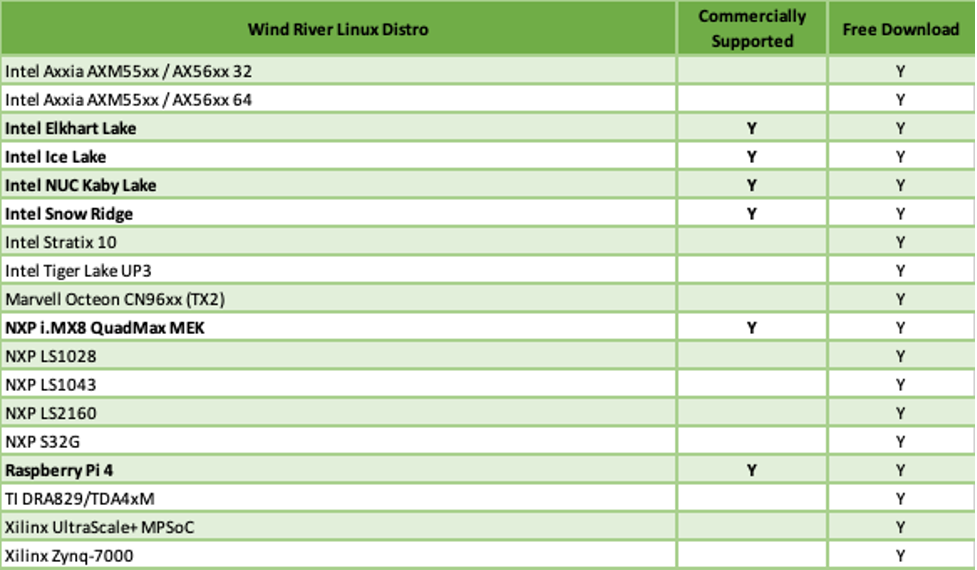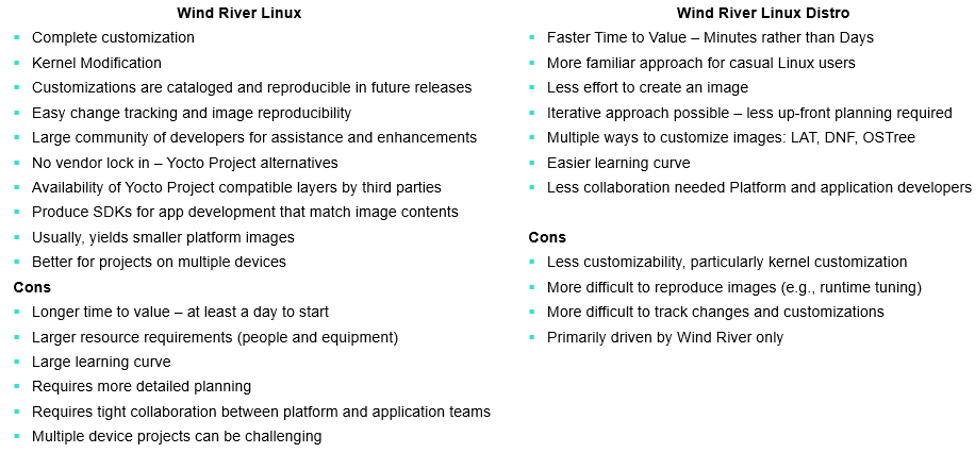
Wind River is proud to announce a new member of the commercially supported Wind River Linux family, the Wind River Linux Distro. The Wind River Linux Distro (Distro) is a binary Linux distribution created from our source-code based Linux product.
Wind River Systems, the leader in the IoT and embedded operating systems, has long provided customers with the ability to create their own purpose-built Linux operating system from source. Wind River starts with the Yocto Project and adds a significant amount of integration with semiconductor vendor SDKs to provide a commercially supportable Linux distribution builder for intelligent edge solution developers.
Wind River Linux is used in tens of thousands of telecommunications, industrial, aerospace and defense, and automotive embedded solutions, but we realized that not all customers need the flexibility of building and Linux operating system from source code.
Introducing the binary Distro
The Distro is intended for intelligent edge solution developers who want to leverage the tremendous investment in embedded device hardware and open-source software made by Wind River but want to avoid the time and effort of building Linux from source.
The Distro provides multiple methods for solution developers to create a purpose-built Linux OS from binary images. These methods include: micro-start self-deploying images, Linux Assembly Tool (LAT), dnf package feeds, a container base image on Dockerhub, and a software development kit (SDK).
Because bug fixes and security updates are important for security and stability, the Distro provides OSTree updates that can be used to deliver fixes or even upgrade images to a new release. Solution developers can create their own images, containers, packages & package feeds, and even their own OSTree update feeds.
Hardware support
One of the key advantages of using Wind River Linux has been the support for a wide variety of hardware platforms. Wind River takes the SDKs from semiconductor vendors and integrates them into the Wind River Linux Yocto Project source base. Unlike some other binary distributions, the Wind River Linux Distro is not limited to just upstream Linux hardware enablement and we regularly update our hardware support from the latest semiconductor vendor SDK.
The Wind River Linux Distro has been available for several X86 and Arm hardware platforms as a free and unsupported download since 2021. Thousands of images have been downloaded since we made the images available with the launch of Wind River Linux LTS21 last year.
With this announcement, we are now offering commercial support for some of the Distro hardware platforms.
Like the Wind River Linux source-based product, the Wind River Linux Distro does not require any paid subscriptions or royalties on deployed systems: the Wind River Linux Distro is sold on a per-project basis.

We will add commercial support for additional hardware platforms based on customer demand.
Choosing the “Right” Wind River Linux
Generally, the Wind River Linux source-based product provides the ultimate amount of flexibility and reproducibility and is particularly well suited to intelligent edge solution developers who require complex customization of Linux including the kernel.
In contrast, the Wind River Linux Distro is the best choice for rapid prototyping and deployment when there is limited need for Linux kernel customization and generally requires significantly less resources than our Yocto Project based source product.

Try it out for free
Anyone can try the Distro for free. Just go to https://www.windriver.com/products/linux/download. After registering and choosing your hardware platform, you will be sent a link to the images and SDK.
The quick start guide Distro Developers Guide can help you to use Distro tools such as the Linux Assembly Tool (LAT) and how to build your embedded solution on top of the Wind River Linux Distro.
Summary
The Wind River Linux Distro is a true binary distribution of Linux that solution developers can use to quickly provide a Linux OS foundation for their intelligent edge solution. Solution developers can try out the free version of the Distro knowing that commercial support is available when they deploy their solution.
